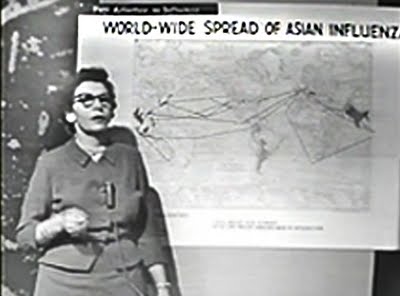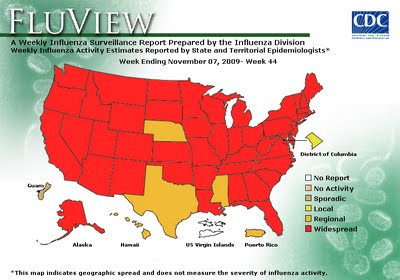IS H1N1 ON MY MONEY?
 Because H1N1 is a virus, it isn’t able to live long outside of a host body. That means that Swine flu dies within about 20 minutes when outside of an infected person. This means that most dollar bills encountered in your daily life will be free of H1N1. But notice I said most. When H1N1 is suspended within human mucus on paper money, it can live up to TEN DAYS !
Because H1N1 is a virus, it isn’t able to live long outside of a host body. That means that Swine flu dies within about 20 minutes when outside of an infected person. This means that most dollar bills encountered in your daily life will be free of H1N1. But notice I said most. When H1N1 is suspended within human mucus on paper money, it can live up to TEN DAYS !Now you may be thinking, “Okay, well, as long as my cash isn’t dripping in snot, it looks like I’m in the clear!” Not so! Four out of Five paper bills are contaminated with at least tract amounts of cocaine. Users of cocaine will roll up bills, insert them in their mucus-rich noses, and snort up the powdery drug. When these bills are put back into circulation, they are able to cross contaminate and spread mucus, bacteria, viruses, and trace amounts of cocaine to other bills. If a few contaminated bills get into a money counting machine, hundreds of bills can all become contaminated within a matter of seconds! The same thing goes for infected bills that are introduced into ATM machines, money tills, or even the one dollar bills your grandmother put in your birthday card!
WHAT ELSE IS ON MY MONEY!?
H1N1 and flu viruses aren’t the only pathogen that can survive and spread via paper currency. “Researchers at the Wright-Patterson Air Force Base in Ohio collected 68 dollar bills from people at a grocery store and a high-school sporting event. According to Dr. Peter Ender, lead researcher, sixty-four (94%) of the bills were contaminated with bacteria known to cause either serious or mild illness. Five bills (7%) were found to be contaminated with bacteria which can cause infections in healthy people. Those bacteria included Staphylococcus aureus and Klebsiella pneumoniae, both of which can cause pneumonia or blood infections. Fifty-nine bills were contaminated with bacteria that are usually harmless in healthy individuals, but can still trigger serious illness in those with depressed immune systems, such as people undergoing various types of medical treatment or those with HIV.”(From Hawaii Reporter, May 15, 2008)
 While those were some staggering statistics and diseases on paper currency are a big problem, on average a dollar bill poses no more of an infectious threat than the average computer keyboard or office doorknob. (Fun Fact – studies have shown that a dollar bill IS dirtier than the average toilet seat!) However, as time progresses, international monetary transactions become more and more commonplace. Your office doorknob has, and will always be, connected to a door in your office. A dollar bill could travel to Hong Kong, then to India, then to Las Vegas, and then to you! The risk of slightly different mutations of common diseases that exist in other continents traveling back to the US is a very real possibility. In this world full of modern, drug resistant germs and bacteria, a treatment-resistant version of a common disease could very well be introduced to the United States from a foreign land via paper money.
While those were some staggering statistics and diseases on paper currency are a big problem, on average a dollar bill poses no more of an infectious threat than the average computer keyboard or office doorknob. (Fun Fact – studies have shown that a dollar bill IS dirtier than the average toilet seat!) However, as time progresses, international monetary transactions become more and more commonplace. Your office doorknob has, and will always be, connected to a door in your office. A dollar bill could travel to Hong Kong, then to India, then to Las Vegas, and then to you! The risk of slightly different mutations of common diseases that exist in other continents traveling back to the US is a very real possibility. In this world full of modern, drug resistant germs and bacteria, a treatment-resistant version of a common disease could very well be introduced to the United States from a foreign land via paper money.IS ANYONE DOING ANYTHING TO MAKE MONEY LESS FILTHY?
Yes there is! But unfortunately, only in Japan. Since the late 1990’s, certain Japanese banks have been introducing new ATM machines designed to dispense clean, sterile money. These special, “clean ATMs,” take in contaminated, wrinkled, old yen. The old bills are then fed through metal rollers heated to 392°F. This kills 90% of all bacteria and leaves the notes flat and crisp. Hitachi invented this sanitization process by accident when trying to create a machine to iron out crumbled bills. When the designers realized that the high temperature required to iron the bills also killed bacteria, the clean ATM was born. Cash is a favored gift at Japanese weddings, and because of Japan’s extremely high regard for cleanliness, no respectable Japanese would give anything but untainted bills.
WHAT CAN I DO ABOUT MY FILTHY MONEY?
If you have any contaminated money you would like to get rid of, please e-mail me, and I can arrange the pickup and disposal of any contaminated bills, from $1 to $100. Hahahaha. Seeing as no one wants to do that, there are other ways you can feel safe about handling money. Day to day money handling won’t lead to a high risk of infection, but for people who handle lots of paper bills a day, like people who work at cash registers, catching something from money can be a real possibility. Keep hand sanitizer with you, and use it often. Until the US gets clean ATMs, washing your hands frequently is the best way to prevent getting sick from your money.
Hopefully this article helped you realize how any why money becomes contaminated. Remember, if you have an outbreak of disease in your home, school, or office, Bio-Clean of New Jersey offers complete decontamination services. For more information on Bio-Clean Disease Decontamination, give us a call or check out our website!
Until the next post, stay healthy- and get that five’r out of your mouth!
Labels: disease, H1N1, H1N1 decontamination, infection control, money
While H1N1 is now officially the first pandemic of the 21st Century, it’s not the first Pandemic to strike in recent history. Today, we’re going to take a look back at three flu pandemics of the 20th century – the “Spanish Flu,” the “Asian flu” and the “Hong Kong Flu.”
 SPANISH FLU – 1918
SPANISH FLU – 1918I think the quickest way to get you up to speed on the general, “vibe” of the Spanish flu, is that it has been described as the, “WORST MEDICAL HOLOCAUST IN HISTORY.” The 1918 Flu pandemic spread to almost every part of the world—even remote pacific islands and the arctic had cases of the disease. Between March 1918 and June 1920, Spanish flu killed anywhere from 50 to 100 MILLION people worldwide. To put this into perspective, that is three to seven times the amount of people killed in WWI, or 3-6% of the world population. One-third of the world population (500 million people) was infected with disease.
If widespread infection and a death toll that surpassed that from a WORLD WAR wasn’t enough, Spanish flu had a few more horrible tricks up its sleeve. Spanish flu greatly weakened the immune system, allowing bacterial pneumonia to creep in and kill those who were infected. The virus itself also took many lives, as it cause massive hemmorages and edema in the lungs. This led to people bleeding to death via hemmorages in the stomach, intestines, lungs, ears, and skin. Talk about a HORRIBLE way to die!
Spanish flu was first recorded in the United States, and quickly spread to Europe. So why isn’t Spanish Flu called United States Flu? Spain was neutral during WWI, so they had no censorship on information about the disease, its effects, and how to treat it. Therefore Span gave the most legitimate and reliable news n the pandemic, and in the process gave a false impression that Spain was the most or only country affected.
Spanish Flu spread quickly with help from WWI. Soldiers were kept in close quarters in cold, wet trenches. They were also exposed to chemical weapons, stress, and were frequently malnourished, leaving them with weakened immune systems. Another reason the disease was so brutal, was that modern transportation was available during a pandemic for the first time, greatly increasing the worldwide spread of the disease. Finally, the lack of true modern medicine meant that Spanish Flu was frequently misdiagnosed as dengue, cholera, or typhoid, and therefore was not properly treated.
Noo ne is completely sure how the Spanish Flu virus came to infect humans. Some researchers believe it may have jumped from a mammal to humans, but most believe it to be a type of Avian flu.
 ASIAN FLU – 1957
ASIAN FLU – 1957Asian Flu was a type of Avian Influenza that originated in China. The Pandemic lasted from 1956-1958. A Asian flu jumped from wild ducks to human beings via a genetic mutation. The flu spread throughout china and parts of Asia in 1956, and made its way to the United States in June 1957.
According to the World Health Organization, Asian flu killed 2 million people worldwide, and 69,800 in the US. Due to scientific advancements science 1918, the Asian flu virus was quickly identified, and a vaccine was developed within a year of its discovery.
 HONG KONG FLU – 1968
HONG KONG FLU – 1968July 1968 marked the first recorded outbreak of Hong Kong Flu. By the end of the month, the virus had already spread to Vietnam and Singapore. The Hong Kong Flu virus evolved directly from the Asian Flu virus, and despite the similarity between the two viruses, little improvements had been made in how to handle a flu pandemic.
The Hong Kong flu made it to the United States in September 1968, brought home by returning Vietnam War troops. The disease became widespread in America by December 1968, and by 1969 the disease had made it to Japan, Africa, and South America.
Compared to the Spanish and Asian flu, the Hong Kong flu had a low mortality rate. Only 0.5% of those infected died. Hong Kong flu killed 1 million people worldwide, with 33,800 of those people being American.
Besides improved medical and scientific advancements, another reason that the Hong Kong Flu was not as deadly was that many people were partially vaccinated before it even existed. Since the Hong Kong flu evolved directly from the Asian Flu, anyone who contracted the Asian Flu had a significant immunity to the Hong Kong Flu.
SO – while H1N1 could almost never be as bad as the 1918 Spanish Flu, it’s still a very serious disease. One of the main reasons that H1N1 is not as deadly as the Spanish Flu is that we now have improved antibiotics, vaccines, and plans to follow to stop pandemics in their tracks. Remember – you are the first line of defense against the spread of H1N1. If you’re sick: STAY HOME! Wash your hand frequently, and always cough into a tissue or your bent elbow.
Furthermore, if you are a teacher or business owner who believes that H1N1 may be present in your property, do the right thing: Call Bio-Clean of New Jersey. As the years passed during the 20th Century, flu pandemics became less and less deadly – But that’s only because scientific advancements got better. Bio-Clean uses a cutting edge, broad spectrum disinfectant and dispersal system to statistically lower you and your employee’s risk of infection. Check it out on our website! Don’t risk having sick employees or having to close your business- Call Bio-Clean of New Jersey today and ask about the scientific advancements in Flu Decontamination.
Labels: flu, H1N1, H1N1 decontamination, Pandemics, seasonal flu

State health officials yesterday announced six adults died from the swine flu in nine days this month.
The recent string of deaths does not mean the swine flu, or H1N1 flu as it is also known, has evolved into a more deadly virus, said Deputy Health and Senior Services Commissioner Susan Walsh. Most who contract the illness miss some school or work but recover quickly without a hospital stay.
But the illness has now been reported in every county since the initial outbreak in April, so people should take precautions, Walsh said.
"It is important that everyone remember the public health measures that can reduce the chances of contracting the disease Ð get vaccinated against H1N1, wash your hands frequently, cover your cough and stay home when you're sick," Walsh said.
The swine flu has killed 28 New Jerseyans since April. However only two were children, bucking a national trend.
"The main point is the (outbreak) is so unpredictable, nothing surprises me," said state Health Commissioner Heather Howard.
The six who died this month had underlying medical conditions such as asthma, diabetes and obesity, Walsh said. They are: a 24-year-old Passaic County man who died Nov. 2; a 30-year-old Passaic County man who died Nov. 5; a 36-year-old Burlington County woman who died Nov. 6; a 42-year-old Somerset County woman who died Nov. 7; a 42-year-old Burlington County woman who died Nov. 8; and a 33-year-old Ocean County woman who died Nov. 11.
Walsh used the announcement to publicize telephone and online resources to help people locate the vaccine, which is in short supply. Today, the state is expected to submit new orders for certain forms of the vaccine Ð a sign back orders are clearing, said state health department spokeswoman Donna Leusner.
Google Inc. has launched a flu shot finder with the locations of clinics that offer seasonal and H1N1 vaccines, Walsh said. The link is available at www.google.com/flushot and the department's Web site at http://nj.gov/health/flu/h1n1.shtml. State residents may call New Jersey's H1N1 Information Hotline, (866) 321-9571, from 9 a.m. to 5 p.m. seven days a week.
Labels: flu, H1N1, H1N1 decontamination, seasonal flu
